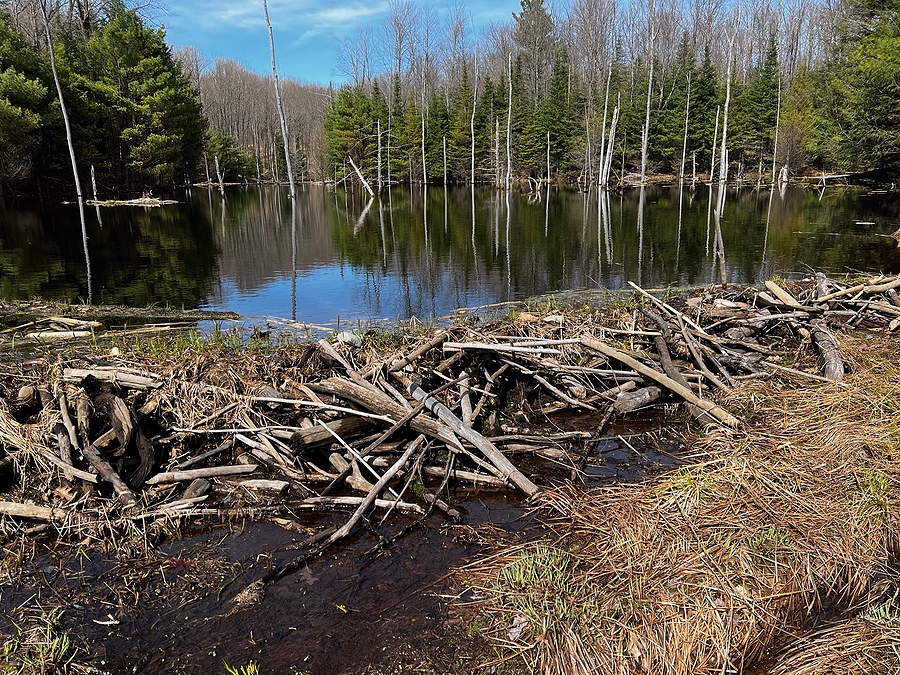Beaver dams, wondrous natural structures often found in our local waterways, have long sparked a debate among landowners, environmentalists, and communities at large. They are impressive feats of animal engineering, boasting an array of ecological benefits, such as water purification and habitat creation. However, these structures are not without their challenges. Beaver damage can result in flooded properties, compromised roadways, and potential health risks due to stagnant water.
This blog post aims to delve deeper into the benefits and risks associated with beaver dams, while exploring some practical and humane beaver control measures that can strike a balance between encouraging these intriguing creatures and safeguarding our properties and communities. Let’s plunge in!

Why Beaver Dams are Important for the Eco-System
Beavers, renowned for their woodworking skills and tree-chewing abilities, are often considered a nuisance by landowners. However, the truth is that beavers play a vital role in our ecosystem. These industrious creatures build dams to create ponds – an ideal habitat for themselves and other species. Here’s how they benefit the environment:
Water purification: Beaver dams slow down water flow, allowing sediment to settle at the bottom and reducing pollutants in the water.
Flood control: These dams act as natural buffers against floods by storing excess water during heavy rainfall and gradually releasing it downstream.
Habitat creation: The ponds created by beaver dams provide a haven for a diverse range of species, such as fish, birds, amphibians, and insects.
Carbon storage: The creation of wetland habitats by beaver dams helps in trapping carbon from the atmosphere, mitigating the impacts of climate change.
The Risks Posed by Beaver Dams
Although beaver dams offer numerous ecological benefits, they can also bring about challenges for landowners and communities. Some common concerns are:
Flooded properties: When beaver dams block streams or culverts, they can cause flooding on adjacent properties.
Damage to infrastructure: The gnawing activities of beavers can damage trees, crops, and irrigation systems. Dams can also obstruct roadways and culverts, leading to costly repairs.
Health hazards: Stagnant water, often found in beaver ponds, can become a breeding ground for mosquitoes and other disease-carrying insects.
Safety risks: Beaver dams can create unexpected changes in water levels and currents, posing a threat to recreational activities such as swimming and boating.
Finding a Balance: Practical Solutions for Beaver Control
It’s clear that beaver dams have both benefits and risks. So, what can landowners and communities do to strike a balance? Here are some humane, practical measures for beaver control:
Beaver deceivers: These devices mimic the sound of running water, deterring beavers from building dams in undesired areas.
Flow devices: Similar to beaver deceivers, these devices regulate water flow and prevent dam building.
Fencing: Installing fencing around valuable trees, crops, or infrastructure can protect them from beaver damage.
Tree wrapping: Wrapping tree trunks with wire mesh can discourage beavers from gnawing on them.
Relocation: As a last resort, when other methods are not effective, relocating beavers to a more suitable habitat can be considered. A professional wildlife control company can help you with this.
In Summary
Beaver dams, despite the risks they may pose, have undeniable ecological benefits. It’s crucial for people to understand the importance of these structures and work towards finding solutions that allow us to coexist with beavers while minimizing potential negative impacts. By implementing practical and humane beaver control measures, we can strike a balance between preserving our properties and supporting the vital role beavers play in our ecosystem. So, let’s appreciate these fascinating creatures and their impressive engineering skills while finding ways to peacefully coexist with them. After all, they are an essential part of our natural world and deserve our respect. Keep calm and beaver on!
Would you like professional assistance with the removal and control of nuisance beavers around your property? Contact Smoky Wildlife Control at 615-610-0962 for TWRA licensed beaver removal and control in Nashville, Tennessee, and surrounding counties. We serve residential and commercial clients.
Related Posts:
10 Reasons Why Professional Beaver Control is Necessary for Homeowners
The Ecological Importance of Beavers
Should I Be Worried About Beavers on My Property?
